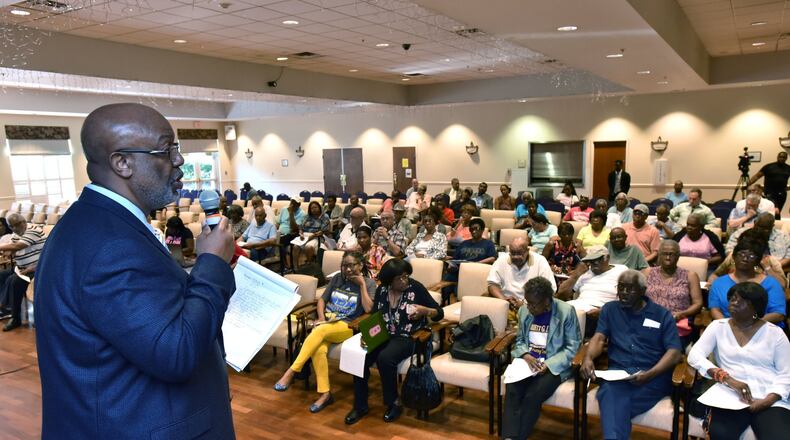Perhaps the recent high property assessments in Fulton County shouldn't have come as such a shock.
A year ago, when homeowners in Cobb, Gwinnett, Clayton and DeKalb counties saw 7 to 11 percent increases, those in Fulton were on average only 2.6 percent higher.
It wasn't because no one wanted to buy houses in Fulton County. Rather, the former chief appraiser told The Atlanta Journal-Constitution a year ago in June, he chose to delay the increases because his office had planned door-to-door reassessments that could significantly raise property values over the following three years.
Guess what? Year one is here.
Fulton County commissioners plan to side-step the issue of higher values for now when they vote Wednesday to freeze assessments at last year's values. That could have an impact on property tax collections, though local governments can raise or lower their tax rates to control how much homeowners have to pay.
When it comes to starkly higher values, though, why are we even here?
Doug Kirkpatrick, the former deputy chief appraiser for the county, said it was a combination of under staffing and errors in housing data that led to the county being behind.
Fulton had not evaluated its residential data since the 1990s, he said. Since then, he said, new cities were formed that didn’t always share their building information in the same way. A high number of appeals after the recession meant assessors weren’t out in the field assessing as much as they should have been — they were instead defending the values they had come up with in previous years. And there were typos when inputting data.
Kirpatrick left Fulton in November after former Chief Appraiser David Fitzgibbon was let go.
Kirkpatrick acknowledged “There were an awful lot of errors.”
That’s why he and Fitzgibbon planned to use small increases over several years to protect homeowners whose property data was incorrect.
No, it wasn’t strictly legal. But the Department of Revenue only assesses the assessors every three years, so the county “could have legally gotten away with that,” Kirkpatrick said.
Dwight Robinson, the current chief appraiser in Fulton County, said when he took over the job, he was faced with the question of whether to postpone nearly 320,000 valuations while waiting for them all to be correct.
Yes, he said, there are errors. But the county’s appeals process allows residents to call them to the chief appraiser’s attention and work them out.
If he had waited, he said, the shock from high appraisals would have been even worse.
And Robinson said he wouldn’t be “inclined to follow” a plan for helping homeowners that wasn’t legal.
“I couldn’t wait until 2019 to reassess parcels,” he said. “That would’ve been even harder to do.”
Other counties don’t wait 20 years to look closely at their housing stock.
“One or more years with no reevaluation can certainly put you behind the 8-ball,” said Stewart Oliver, the chief appraiser in Gwinnett. “We analyze our data constantly.”
Stephen White, the Cobb chief appraiser, said it’s hard to keep up when there are distressed sales — like foreclosures — skewing the data. But for the past few years, the market has made more sense.
“Why are the other counties not going through this?” he asked. “We have been doing a good job keeping up-to-date with the marketplace.”
Members of Fulton County’s legislative delegation are looking for ways to avoid repeating this year’s problems.
At a meeting Monday , Sen. John Albers, R-Roswell, said he has already drafted legislation that would limit the tax increase residents see each year.
The bills emulate the 3 percent cap both Fulton County and Sandy Springs have in place and would apply to Atlanta and Fulton County schools, as well as all the other cities in Fulton.
School tax exemptions for senior citizens, limits on huge value increases in gentrifying neighborhoods and requirements that properties are assessed annually could also be required.
Albers said it his he “absolute intention” to pass multiple changes in Fulton next year. From there, he said, the bills could be applied statewide.
Until then, the onus is on the taxing authorities to decide what to do to help ease the pain for homeowners.
A survey of Fulton governments showed that many intended to reduce the burden on taxpayers. In Fulton County, commission chairman John Eaves said he intends to maintain a tax rate that keeps the county’s take revenue neutral. Before the county decided to freeze values, Courtney English, the chairman of the board of education for the Atlanta Public Schools, said the district planned to reduce its tax rate. Atlanta Chief Financial Officer Jim Beard said in May that the city plans to, too.
How much relief they want to offer taxpayers remains to be seen.
“We’re standing by,” said Robbie Rokovitz, the city manager of Chattahoochee Hills. “We plan to do some sort of rollback, but we don’t even have the preliminary digest yet.”
———————————————————————————————
IF YOU GO
Fulton County Board of Commissioners
10 a.m. Wednesday
Fulton County Government Center
141 Pryor St. SW
Atlanta
About the Author
Keep Reading
The Latest
Featured




